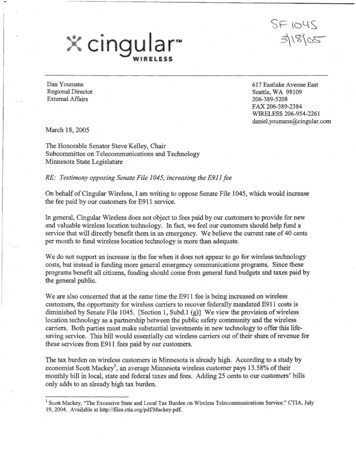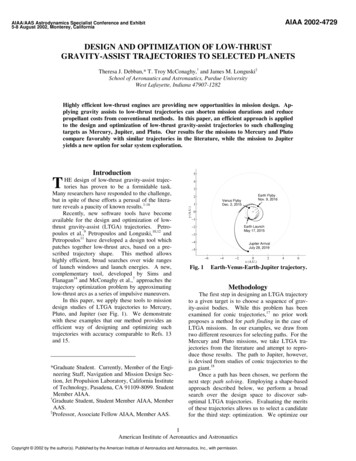
Transcription
SFc11nDan YoumansRegional DirectorExternal Affairs{D4S3\\ \ 617 Eastlake Avenue EastSeattle, WA 98109206-389-5208FAX 206-389-2384WIRELESS 206-954-2261· daniel.youmans@cingular.comMarch 18, 2005The Honorable Senator Steve Kelley, ChairSubcommittee on Telecommunications and TechnologyMinnesota State LegislatureRE: Testimony opposing Senate File 1045, increasing the E911 feeOn behalf of Cingular Wireless, I am writing to oppose Senate File 1045, which would increasethe fee paid by our customers for E911 service.In general, Cingular Wireless does not object to fees paid by our customers to provide for newand valuable wireless location technology. In fact, we feel our customers should help fund aservice that will directly benefit them in an emergency. We believe the current rate of 40 centsper month to fund wireless location technology is more than adequate.We do not support an increase in the fee when it does not appear to go for wireless technologycosts, but instea ;l is funding more general emergency communications programs. Since theseprograms benefit all citizens, funding should come from general fund budgets and taxes paid bythe general public.We are also concerned that at the same time the E911 fee is being increased on wirelesscustomers, the opportunity for wireless carriers to recover federally mandated E911 costs isdiminished by Senate File 1045. [Section 1, Subd.1 (g)] We view the provision of wirelesslocation technology as a partnership between the public safety community and the wirelesscarriers. Both parties must make substantial investments in new technology to offer this lifesaving service. This bill would essentially cut wireless carriers out of their share of revenue forthese services from E911 fees paid by our customers.The tax burden on wireless customers in Minnesota is already high. According to a study byeconomist Scott Mackey 1, an average Minnesota wireless customer pays 13.58% of theirmonthly bill in local, state and federal taxes and fees. Adding 25 cents to our customers' billsonly adds to an already high tax burden.1Scott Mackey, "The Excessive State and Local Tax Burden on Wireless Telecommunications Service." CTIA, July19, 2004. Available at http://files.ctia.org/pdf/Mackey.pdf.
Before the Minnesota Legislature agrees to a fee increase for E911, we would urge that acomprehensive cost study be conducted by the state to determine program needs and appropriaterevenue sources. A 25-cent increase on our customers' monthly bills represents a substantialincrease in revenue. Cingular Wireless wants to be assured that any increase in cost will result indirect benefits to our customers, and not general benefits that should be shared by the public.Thank you for considering our comments.Respectfully Submitted,Dan YoumansC ingular Wireless
Page 1of4For Comcast, It's About Bundling Services? fNf:;fi. .ffi:i:ENWLY FD M ::: ·F"'-3: S:G:RED E- ·February 16, 2004For Comcast, It's About Bundling ServicesBy SETH SCHIESELI s Comcast's bold bid for Disney in fact a conservative move?"Audacious" seemed to be journalists' favorite word to describe the hostiletakeover offer last week. But if the Comcast Corporation, the nation's largest .cable provider, succeeds in acquiring the Walt Disney Company, the movecould be seen as a way to control costs and ensure adequate inventory for themost mature and slowest-growing part of its cable business: videoprogramming.Traditional movies, sports, news and television.series will surely be amainstay of the cable industry for years to come. So, Comcast and other cablecompanies have every motive to control as much of those areas as possible.But for Comcast, the real growth prospects lie in technologies and services particularly the bundling of high-speed Internet access and cable-basedInternet telephone services - that have little to do with an old-line mediaconglomerate like Disney."When we talk about core video, it will still be a really important part of ourbusiness," said David N. Watson, executive vice president of marketing forComcast's cable operation. "But the inore rapid growth will come from highspeed data, telephone and digital services."To be sure, Disney movies and children's television programming could helpstimulate the growth of digital services lik.e video-on-demand. And Disney'sESPN sports network, already one of the most popular.parts of any cablelineup, could persuade consumers to adopt digital high-definition programpackages.For Comcast or any other modem cable company, though, the real goal is toexpand beyond television to become a household's one-stop siness/media/16pipe.html ?pagewanted print&posi. 2/18/2004
For Comcast, It's About Bundling ServicesPage 2 of 4shop - collecting not only cable television revenue but also money that theconsumer might otherwise be paying to a telephone.company and an Internetaccess provider. That is why cable companies have spent tens of billions ofdollars in recent years on digitally updating their systems.For cable companies, new digital services are not just an opportunity, they arean imperative. Overall cable subscribership is basically stagnant, and in somecases it is declining because of heated competition from satellite operators.While most of the largest cable companies have used new services toessentially stabilize their subscriber levels, the satellite industry still appearsto be poaching customers from smaller rural cable operators that lack thewherewithal for major digital upgrades."There's literally a tug-of-war going on between satellite and cable, andbetween telephone companies and cable, over how much revenue you cangenerate from a customer," said Richard Greenfield, a media analyst forFulcrum Global Partners, an independent research firm. "I think cable isprobably the No. 1 model for bow bundling retains customers and drives uprevenues·."Mr. Greenfield is among the analysts who predict that standard television'scontribution to cable operators' revenue will continue to shrink. In perhapsfive years, "at best it's 50 percent, and it could easily be below 50 percent,because I think high-speed data and telephone will take a greater percentageof spending."In the sheer amount of digital information they can convey, modem digitalcable networks dwarf local telephone systems. Cable systems far surpasssatellites in technical flexibility, especially for Internet access and video-ondemand services. It is cable's power that is causing the local telephone giantsand satellite television titans to pursue joint ventures with one another soeagerly.The shift in the cable industry's revenue model is already under way, and canperhaps be seen most clearly in the financial data of Cox Communications,the nation's No. 4 cable operator. In the first quarter of 2001, video servicesrepresented more than 87 percent of the company's residential revenue of 848 million. In less than three years, in the final quarter of 2003, that figurehad fallen to 70 percent, even as total quarterly residential revenue had risenhttp://www.nytimes.com/2004/02/ 16/business/media/ 16pipe.html ?pagewanted print&posi. 2/18/2004
For Comcast, It's About Bundling ServicesPage 3 of 4to 1.32 billion. In that quarter, 18 percent of Cox's residential revenue camefrom its cable-modem operation, and another 10 percent came from telephoneservice."Our telephone and high-speed Internet services have been huge growthengines for us," said Pat Esser, Cox's chief operating officer. "We expect thattrend to continue as more customers realize the value of our bundledofferings." Similar trends are evident at most of the other big cableoperations, including Comcast and Time Warner's cable unit.For satellite executives, the cable industris reach beyond video is derided asa sign of desperation."If I were a cable operator, I would also be talking about other sorts ofservices, because they have been flat or down in their core televisionbusiness," said Bob A. Marsocci, a spokesman for DirecTV, the No. 1satellite television company, which is now controlled by Rupert Murdoch'sNews Corporation. Mr. Marsocci said that DirecTV intended to continueexpanding its offerings of high-definition television and set-top boxes withdigital video recorders. He also said that the company had struck deals withBellSouth, Qwest and Verizon to offer digital subscriber line Internet access.The entire point of the cable industry's recent upgrades, however, was to offersuch a panoply of services over a single integrated system. Local telephonenetworks simply cannot compete with the information capacity - orbandwidth - of a modem digital cable system. And satellite television systemsare not well suited to the two-way communications of video-on-demand andhigh-speed Internet traffic and telephone calls."Cable clearly has a great advantage in terms of getting bandwidth to thehome," said Bob Van Orden, vice president for strategy and productmanagement at Scientific-Atlanta, a leading maker of cable-system gear.The Yankee Group, a technology research co1npany in Boston, estimates thatby the end of 2006, 31.9 million United States homes will have video-ondemand over cable, up from 12.5 million at the end of last year. The firmpredicts that cable-based Internet access, used by 14.6 million households atthe end of last year, will be in 26.5 million homes within three years.http://www.nytimes.com/2004/02/ 16/business/media/ l 6pipe.html ?pagewanted print&posi. 2/18/2004
For Comcast, It's About Bundling ServicesPage 4of4And by the end of 2007, the Yankee Group predicts, more than 10 millionhomes will receive telephone service via cable, up from fewer than 3 millionat the end of last year. Last week, the Federal Communications Commissionbuoyed the industry's prospects by signaling that it would not heavily regulatesuch services, potentially speeding their rollout and adoption.Cable operators, meanwhile, will continue to tune their networks for the nextgeneration of digital applications.HThere are a lot of services we will offer 10 years from no\v that we stillhaven't even thought of today 5 " said Dick Green 5 chief executive of the cableindustris research consortium known as CableLabs "Our job is to make theplatform flexible and efficient and useful enough so that it can support thoseideas."5Looking at a modem cable company like Comcast, it is hard to predict howowning a company like Disney would enhance that digital future. That maybe one reason, so far, many Comcast investors are sour on the Disney bid. Copyright 2004 The New York Times CompanyIHomeIPrivacy PolicyISearchICorrectionsI IBack to ia/16pipe.html?pagewanted print&posi. 2/18/2004
Page 1of8Reach Out and Upend an Industryi?R!'NHR F!i!l'EJHH.Y F\JRMA'l'S S:Gfi:Ea5:' February 15, 2004Reach Out and Upend an IndustryBy MATT RICHTELEFFREY A. CITRON, the man who hopes to tum the telephone industryon its ear, works in a cubicle just down the hall from the "Tony Soprano"conference room. Nearby are the "Meadow" and "Uncle Jr." rooms, though ifthose are full, Mr. Citron's staff could gather in "Dr. Melfi."The conference rooms at Vonage, an Internet telephone start-up in Edison,N.J., where Mr. Citron is chief executive, are named for characters from "TheSopranos." That hints at Mr. Citron's embrace of the unconventional, a traitthat has made him a danger to some of America's most entrenched industries,but also at times to himself.In the 1990's, he helped to pioneer computerized day-trading, putting a thumbin the eye of Wall Street's biggest companies. He amassed a fortune butwound up leaving the industry after he was charged with illegal trading by theSecurities and Exchange Commission. Though admitting no wrongdoing, heagreed to pay a 22.5 million fine and was banned from the securitiesbusiness.Mr. Citron, the Sequel, is no less ambitious. Already one of the nation'swealthiest 30-somethings, he aims to use Vonage's Internet technology tobring fundamental change to the telephone industry, one of the mostentrenched and tradition-bound economic sectors. "I'm going to change theworld," Mr. Citron, 33, said in an interview last month over lunch at the NewYork Palace Hotel. "I did it before. Why not again?"There are plenty of reasons. Mr. Citron's own investors acknowledge thatV onage may be zapped out of existence if it somehow misfires, its customercare problems persist, major rivals provide better service or regulators takesteps like insisting that Internet phone companies pay the same fees as the rmoney/15phone.html?pagewanted prin. 2/16/2004
Reach Out and Upend an IndustryPage 2 of8of the industry.Yet even skeptics credit Mr. Citron with helping to create an inflection pointin the telephone industry by turning Internet telephony - which had long beenjust a great-sounding theory - into a viable product line.IN a little more than a year, he has signed up 100,000 customers who use hisblack box to connect their traditional telephone to the Internet. Customers paya flat fee of around 35 for unlimited local and long-distance phone service,though that figure does not include the more than 40 a month thatsubscribers must also spend for the high-speed Internet access used totransmit the calls.Industry analysts say Mr. Citron's success has hastened development of thetechnology by major telephone and cable companies, which are clearlyfollowing his lead. AT&T and Time Warner Cable, for instance, haverecently announced their own voice-over-Internet strategies; Verizon, Qwest,Cox Cable and others have said they intend to deploy the technology, too.Their efforts come not only in response to V onage, but in the larger context ofthe upheaval in telecommunications. Since the deregulation of Ma Bell, asimmer of competition has turned into a boil. Companies deploying manytechnologies, from cable to wireless, are vying to create voice infrastructurethat they hope will enable them to generate and capture billions of dollars infees from subscribers.So Vonage faces competition not just from big telecommunicationscompanies but also from start-ups even tinier than itself. One of them, Skype,makes free software that lets people talk directly over computers - like a voiceversion of instant messaging - thus bypassing the telephone altogether.Another start-up, Net2Phone, offers Internet phone service directly toconsumers (as does V onage) and works with cable operators to help sellphone service over their lines.Facing off against them all is a man who, by many accounts, is a study inextreme capitalism, not Harvard Business School niceties. Mr. Citron is notabout polite cocktail conversation and low-carb diets; he leans more towardrolled-up sleeves, gut decisions and fast food. At the recent lunch at thePalace hotel, he ordered the salade nic;oise, but mispronounced it ess/yourmoney/1 Sphone.html?pagewanted prin. . 2/16/2004-
Reach Out and Upend an IndustryPage 3 of8In other words, he is not the kind of guy who asks for permission slips. Just ashe barreled into Wall Street seven years ago, breaking china along the way,he is now barging into the telecom fray. In doing so, he has put himself inposition for a great entrepreneurial comeback."He's out for redemption; he wants to prove he can do this, and do thisproperly," said Harry R. Weller, a partner at New Enterprise Associates, aventure capital firm that invested 12 million last year in Vonage. After Mr.Weller's firm conducted extensive due diligence on Mr. Citron, it decided toforge ahead with the investment, despite what Mr. Weller described as thesignificant risk inherent in the technology and the man behind it.That investment was followed last week by a 40 million round of financingfrom two other venture firms: 3i Group, based in London, and MeritechCapital Partners, based in Palo Alto, Calif. As part of the deal, the investorshave structured the board so that Mr. Citron does not have control over it - inpart, Mr. Weller said, to make sure that Mr. Citron is kept within bounds.Still, Mr. Weller said investors were convinced that it takes a personality likeMr. Citron's to shake the foundations of the telephone industry."You need somebody who knows how to disrupt an industry," he said. "Youneed to have a very, very aggressive entrepreneur. What we have to makesure to do is to take the best of Jeffrey Citron."Mr. Citron grew up on Staten Island; his parents worked in the insurancebusiness. As a boy, he says he did not know where his interests lay so muchas where they did not: in school. He often skipped class, keeping mostly tohimself, but he said he scored well enough on tests to offset his absences.He made a quick transition from high school to Wall Street. In 1988, at theage of 17, he joined Datek Securities, where his father had close connections.By 20, he had made his first million as a trader.Mr. Citron left Datek in 1991 to start his own firm, where, with a computerwhiz named Josh Levine, he built the foundation of a computer-tradingnetwork called Island. It let individual traders swap shares inside the system without help from the big Wall Street ourmoney/15phone.html?pagewanted prin. 2/16/2004
Reach Out and Upend an IndustryPage 4 of8"Island was truly revolutionary," said Bill Burnham, who was an analyst atPiper Jaffray during the dot-com boom and is now a venture capitalist atSoftbank Capital Partners. "It allowed individual investors to get direct accessto the market to compete and get the same advantages that professionalmarket makers do."Mr. Citron returned to Datek Securities to create and become chief executiveof Datek Online Holdings. Its technology allowed individuals to make theirown trades automatically for 9.99, far less than the fees charged by fullservice brokers. Datek Online became the nation's fourth-largest onlinetrading firm.But to regulators, Mr. Citron and his associates were involved in somethingfar less upstanding. The Securities and Exchange Commission contended thatfrom 1993 to 1998, he and others were involved in a scheme to use automatedtrading systems to manipulate Nasdaq, exploit loopholes and make millionsof dollars.In October 1999, amid the scrutiny, Mr. Citron agreed to resign as chiefexecutive of Datek Online. The investigations into Mr. Citron and hisassociates led to the agreement in January 2003 in which seven formerexecutives and traders at Datek paid a total of 70 million in fines. Regulatorssaid they had created fictitious customer accounts, used them to place theirown trades and filed false reports.The 22.5 million fine Mr. Citron paid - one of the largest in S.E.C. history only dented his wealth. In 2000, he sold his stake in Datek to private investorsfor 225 million. Today he lives in a mansion in Brielle, N.J., with his wifeand two children.But wealth isn't everything. There is also reputation. And Mr. Citron says hewants his back. What happened at Datek "was 100 percent about beingyoung," he said."We were young, we were na1ve, we were inexperienced, and, yes, there werebackroom dealings," he added. "But that is part of a lot of industries. Thistime, we are doing it differently." "This time" began with a helicopter ride.Mr. Citron flew from New Jersey to Melville on Long Island in the summerof 2000 to meet with Jeffrey Pulver and the other principals of a yourmoney/15phone.html?pagewanted prin. 2/16/2004
Reach Out and Upend an IndustryPage 5 of8called Min-X.com. Min-X was trying to create a market where companiescould trade excess phone network capacity in blocks of minutes, in much thesame way commodities like oil are traded. The principals approached Mr.Citron for financing.He invested what he calls a "significant portion" of the 12 million raised inthat first round of financing. But it was far from an arm's-length transaction.He took an active role in the company, immediately replacing Mr. Pulver aschief executive and then changing the concept for the business. Mr. Citronsaid that it was while flying from California to New Jersey in December 2000that he decided to focus the company on offering Internet-based telephonecalls, transforming it into V onage.THE quick decision jibes with his overall philosophy that a good businessidea does not require endless analysis. "If you can't figure it out in fourmonths, you shouldn't do it," he said. "If you can't figure it out in a week, youshouldn't do it."The concept of Internet-based calling was not new. It generated much buzzduring the dot-com boom and was being pushed heavily by technologycompanies like Cisco Systems, which wanted to sell equipment that would beused to route calls as data.The basic idea is to transmit telephone with the same technology used tohandle e-mail and other Internet traffic. Calls are digitized and delivered aspackets of data, rather than as traditional voice signals.That may sound simple, but the reality was much more complex, particularlybecause the existing telecommunications giants had spent a century investingin a different type of technology, called circuit switch.Mr. Citron was hardly the first person to understand that Internet calls werepotentially less expensive than those made using circuit switch - for a varietyof reasons. With circuit switch technology, a telephone line is dedicated to asingle conversation. But when the packets are sent as data, that line can sendmany signals at once, making far more efficient use of thetelecommunications infrastructure. In addition, Internet equipment is lessexpensive and gives operators and consumers more control over voice traffic- for instance, allowing people to get an e-mail reminder each time rmoney/15phone.html?pagewanted prin. · 2/16/2004
Reach Out and Upend an IndustryPage 6 of8receive a voice mail message.But for all the advantages, and the hype, no one had figured out the basics:how to affordably hook a traditional phone into the Internet, then send a voicestream directly to another telephone. Mr. Citron and a small team spent thefirst half of 2001 working to solve the problem.Louis Holder, a co-founder ofMin-X who is now in charge of productdevelopment at Vonage, said it was a time of voracious fast-foodconsumption ("Everybody put on 10 pounds") and exhilaration. "Nobody haddone this in the consumer space," he said.The breakthrough came late on a Thursday night in June. Mr. Holder said he,Mr. Citron and two engineers figured out how to send a digitized call fromone telephone to another through a firewall, a defense barrier between acomputer or network and the wider Internet.Initially, the company wanted to create partnerships with cable companies tohelp them in their assault on traditional telephone companies. But there wasskepticism. V onage was regarded by some executives as a leftover from thebubble. Besides, the cable companies were having their own problems,punctuated by the bankruptcy of @Home, which delivered Internet accessover cable.So in April 2002, Vonage started a consumer-based service. Secretly, thecompany hoped that if cable companies saw that V onage was successful, theywould consider signing partnerships, Mr. Holder said. But then V onage tookon a life of its own. Within 18 months, it has amassed 100,000 customers, andMr. Holder said the company expects to have250,000 by the end of this year,and 500,000 by the end of 2005. Vonage says it will be profitable this year.Blair Levin, former chief of staff to Reed E. Hundt, chairman of the FederalCommunications Commission during the Clinton administration, said thatV onage had proved that Internet calling could be done, and that it was forcinga giant industry to follow more quickly than it might have otherwise. "It'sgoing to have a huge historical impact," Mr. Levin said. "Vonage was a matchthat was put on some pretty dry timber. But it was a match."But Mr. Levin, like many others, said he wondered whether V onage would oney/l Sphone.html?pagewanted prin. . 2/16/2004
Reach Out and Upend an IndustryPage 7 of8a historical footnote or a viable concern. "The question is: What is theirdefensible asset?" he said, noting that other companies can provide the samekind of service as Vonage, but with the added benefit of having well-knownbrand names and deep pockets. "They're playing in a world in which,traditionally, economies of scale and scope matter a huge amount."An executive at a major telephone company, who requested anonymity, saidV onage was not seen as real competition. And the cable companies, whichare vying to use their high-speed lines to deliver phone service, say they cando it far better than V onage. Cox Communications, based in Atlanta, says thatits version of Internet-based calling is more stable than Vonage's because itoperates the data network, giving it more control. Even Mr. Citron concededthat this was a possibility. "Clearly, there might be some advantages," he saidof the cable industry.INDEED, Vonage acknowledges that it has two overriding challenges. One isthe quality of calls made over its network. Customers often complain ofhaving their calls dropped, or of hearing lags. Mr. Holder says that thishappens because the high-speed Internet access in subscribers' homes can bespotty, and that when the lines falter, so does the call quality.A related problem, Mr. Holder said, is insufficient customer service. Thecompany is scrambling to hire and train qualified people to answer customerconcerns. Vonage has 70 customer service employees and would like to have110, he said.Another major challenge is regulatory. So far, Vonage has been able to keepits costs low because it has been able to avoid the regulations that federal andstate governments place on traditional telephone companies. But that maychange: The F.C.C. said last Thursday that it intends to study the question ofregulating Internet calling over the next year.Mr. Citron said he hoped regulators would make the rules clear. He also saidhe did not intend to get into any gray areas, as he did in his first incarnation asa disruptive entrepreneur. But, in one way, he would like to see a similaroutcome.Internet calling, he said, "will be a large and transfonning yourmoney/l Sphone.html?pagewanted prin. 2/16/2004
Reach Out and Upend an IndustryCopyright 2004 The New York Times CompanyPage 8 of8IHomeIPrivacy PolicyISearchICorrectionsIHelpIBack to money/15phone.html?pagewanted prin. 2/16/2004
Senate Counsel, Research,and Fiscal AnalysisSenateG-17 STATE CAPITOLState of Minnesota75 REV. DR. MARTIN LUTHER KING, JR. BLVD.ST. PAUL, MN 55155-1606(651) 296-4791FAX: (651) 296-7747Jo ANNE ZOFF SELLNERDIRECTORs F.No. 688 - Cable Franchise Regulations.\6Author:Senator Steve KelleyPrepared by:Matthew S. Grosser, Senate Research (651/296-1890)0Date:March 17, 2005The bill repeals current law prohibiting a municipality from granting an additional franchisefor cable service in an area on terms or conditions more favorable or less burdensome than thosegranted to the existing franchise with respect to the area served or public, educational, orgovernmental access requirements. Repeals current law allowing a municipality to grant anadditional franchise on more favorable or less burdensome terms when the existing franchise is notactually providing service in an area. The bill also repeals a municipality's current authority toimpose additional terms and conditions on additional franchises.The bill provides that the grant of an additional cable franchise may include an area similarto that served in an existing franchise or another area that is deemed to be necessary or desirable toreasonably meet the needs of the municipality or its franchise authority. The bill requires that anadditional cable franchise must ensure that all subscribers receive the same local public, educational,and governmental access channels with their franchise area as are specified in an existing franchise.Existing franchise providers are required to permit an additional franchise provider to connect to itslocal public, educational, and governmental channel feeds and provide an additional franchiseprovider with the programming on those channels, with the cost of connection to be incurred by theadditional franchise provider.An additional franchise provider shall make annual financial contributions equivalent, on aper customer basis, to the public, educational, and governmental access services, equipment, andfacilities provided by the existing franchise provider. An additional franchise provider may satisfyits requirements regarding in-kind contributions, such as cameras and production studios, bynegotiating with the existing franchise provider and the municipality or its franchise authority so thatpublic, educational, and governmental access and local origination services are improved orincreased.·
An additional franchise provider must comply with new public, educational, andgovernmental access and local origination obligations imposed by a cable franchise renewal. It mustnot be required to displace other programmers to accommodate such uses, hut must complywhenever additional capacity becomes available.A municipality or its franchise authority may not impose public, educational, andgovernmental access and local origination obligations on the additional franchise provider exceedingthose imposed on the existing franchise provider.MSG: cs2
Senate Counsel, Research,and Fiscal AnalysisG-17 STATE CAPITOL75REV. DR. MARTIN LUTHER KING, JR. BLVD.SenateState of MinnesotaST. PAUL, MN 55155-1606(651) 296-4791FAX: (
The conference rooms at Vonage, an Internet telephone start-up in Edison, N.J., where Mr. Citron is chief executive, are named for characters from "The Sopranos." That hints at Mr. Citron's embrace of the unconventional, a trait that has made him a danger to some of America's most entrenched industries, but also at times to himself.










